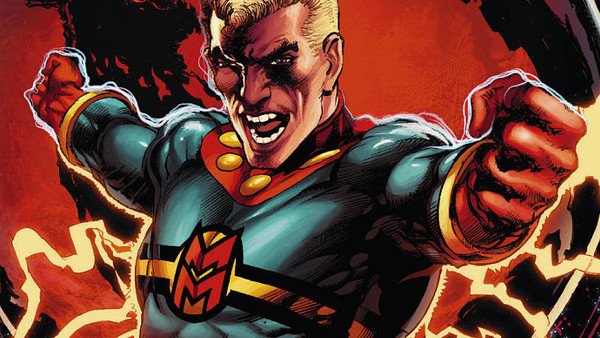10 Amazing Comic Storylines Derailed By Editorial Politics
2. Miracleman

The saga of Marvelman, aka Miracleman, is one of the most complicated and bizarre in comic book industry history. In 1953, American publisher Fawcett Comics discontinued its series Captain Marvel due to a lawsuit from DC, who claimed the hero was too similar to Superman. Because British publisher L. Miller & Son, Ltd. was already publishing black and white reprints of the series, comic packager Mick Anglo was brought in to repurpose the character as Marvelman.
In order to retain the title's audience, Miller continued to use logos and trademarks that were similar to what Fawcett had produced, giving the impression that Marvelman was still Captain Marvel. Anglos association with Miller ended in 1960 and the packager recycled some of his Marvelman stories as Captain Miracle, published under the Anglo Comics imprint. Meanwhile, a variety of Marvelman and Young Marvelman titles continued to be published by Miller until 1963.
The character was picked up again in the early 1980s for the British black-and-white monthly magazine Warrior. A young Alan Moore, getting his first crack at superhero comics, was recruited to write the series until disagreements between Moore and editor/publisher Dez Skinn disrupted that arrangement, and the series ended. By August 1985, another publisher, Eclipse, started printing colorized versions of Marvelman, renaming the series Miracleman to avoid legal complications from Marvel Comics.
Moore wrote the series through issue #16 when Neil Gaiman took over alongside artist Mark Buckingham. Gaiman continued to work on the series until 1994 when Eclipse went bankrupt. Gaiman had produced an issue #25 of that series that was never published. Then, in 1996, artist and Image Comics co-founder Todd McFarlane purchased Eclipses assets including, he believed, Miracleman, despite Gaiman claiming he still maintained ownership of the character. McFarlane used Miracleman's alter ego, Michael Moran, in his Spawn franchise and intended to use other characters in the future until Gaiman sued McFarlane over ownership of the character in 2002.
As it turned out, Skinn never had the rights to sell the Eclipse portfolio to McFarlane in the first place and the sale was nullified. At New York Comic Con last October, Marvel announced it had purchased the rights to Miracleman and in January, started reprinting the series. As part of this arrangement, Gaimans lost issue #25 will finally see the light of day.